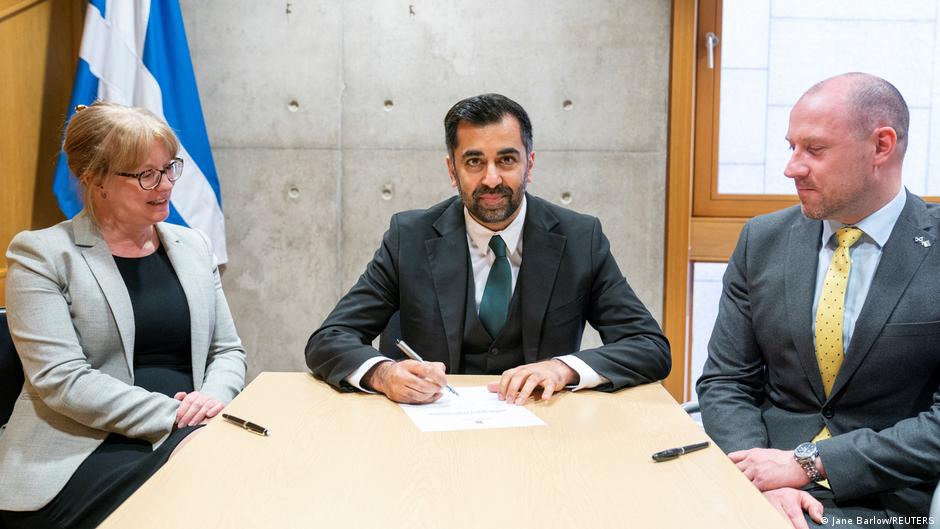How should we rate Humza Yousaf's appointment?

In his victory speech to the Scottish National Party (SNP), Humza Yousaf stood before party members and recalled that his paternal grandfather, who arrived in the United Kingdom as an immigrant from Pakistan in the 1960s, used to work in the Singer sewing machine factory. He spoke of his grandmother, who also came from Pakistan and worked as a bus conductor.
Could they have ever imagined that their grandson, a second-generation immigrant, would be elected head of the Scottish government?! Yousaf himself posed the question, and it doesn’t take much imagination to guess that the answer was "no".
What was completely unimaginable a few decades ago has today become not just very possible, but the norm in British politics. Humza's ethnic and religious origins were downplayed by the press, taking up only marginal space in the British news coverage and reportage.
For the most part, discussions focused on the deep divisions within the Scottish National Party and the decline in its membership and popularity. It also centred on Yousaf's record as a politician and his mixed performance as minister of transport and latterly as minister of health in Scotland.
Hard to find the words to express just how much of an honour it is to lead our country.
I will be a First Minister who will govern for all of Scotland, your priorities will be my priorities. I will work tirelessly to serve you, the people of Scotland. I hope I can do you proud. pic.twitter.com/w7z12B0QBT— Humza Yousaf (@HumzaYousaf) March 31, 2023
A complex equation of factors
Yousaf represents continuity, both within the party and in terms of his predecessor Nicola Sturgeon's legacy; he was both her political confidant and anointed successor. The SNP's ideological fragility, as a one-cause party calling for independence from the United Kingdom, requires smooth handovers of power to maintain its cohesion. Yet a wide range of political and ideological differences co-exist under the umbrella of independence.
Yousaf won narrowly against his rival, Kate Forbes, who represented the socially conservative right-wing of the party in terms of economic policy, while he represented the socially liberal and economically centre-left. Against this background, the Green Party had threatened to leave the ruling coalition, if Forbes and her right-wing agenda had won. That would have brought down the government. It was through this complex equation of factors, some internal and others imposed on the party, that the difficult and historic victory was achieved.
In 2016 when Yousaf was elected to the Scottish Parliament, he stood up to pronounce the oath of allegiance dressed in traditional Scottish attire, with his signature kilt. As is the custom where members of the Scottish Parliament recite their oaths in English and then in one of the local languages such as Gaelic, Yousaf chose to recite his in Urdu, as if it were one of Scotland’s national languages.
The scene was a typical, albeit confusing manifestation of British multiculturalism, the successes of which don't seem to require supporting evidence when compared with the policies of integration and assimilation pursued in other European capitals.
At Westminster, the British government is headed by Rishi Sunak, a Hindu of Indian origin, and he took the oath of office on the Bhagavad Gita, the Hindu holy book. As for the mayor of the capital, London, a position that can lead the incumbent into direct confrontation with the prime minister’s office, it is held, for a second term, by Sadiq Khan, another second-generation immigrant of Pakistani origin who belongs to the Ahmadiyya sect.
Post-imperialist, multi-coloured politics
From right to left, British politics is now multi-coloured. In Yousaf's case, however, he became the first Muslim to be elected First Minister in Western Europe. Hence Yousaf becoming head of the SNP adds very particularly another exceptional aspect to this event. It is also evidence of how flexible contemporary political identities can be in the post-imperial era, and how they can develop and assimilate at the same time.
In other words, the SNP, which is based primarily on identity politics, which achieved popularity by virtue of its historical hostility towards the English and the government in London, and which has strong separatist tendencies on cultural and ethnic grounds, has managed to elect as a Scottish nationalist leader, a dark-skinned, Urdu-speaking Muslim. As for his wife, Nadia El-Nakla, who is also a politician and a local council member for the same party, she is proud of her Palestinian roots which go back to Gaza, where her family still resides. She is very active in the movement for Palestinian rights.
Despite all this, however, the picture is not all rosy, and what happens at the level of the political elite does not necessarily reflect realities on the ground. Just two years ago, in 2020, Yousaf himself filed a case of racial discrimination with the courts against a kindergarten that had refused to accept his daughter.
© Qantara.de 2023
Translated from the Arabic by Chris Somes-Charlton
